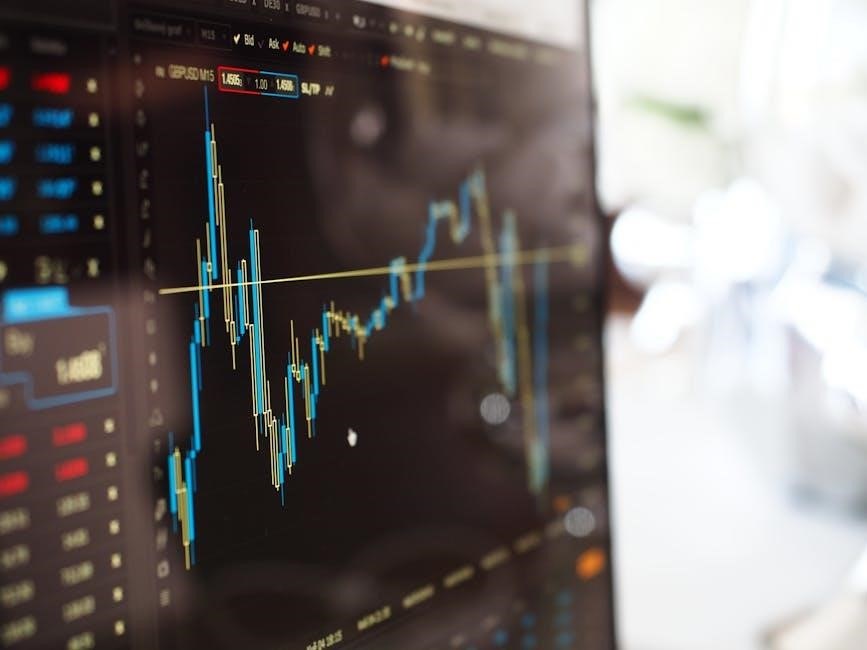Overview of the Book and Its Significance in Trading Psychology
Mark Douglas’s Trading in the Zone revolutionizes trading psychology by focusing on mindset transformation․ It emphasizes overcoming fear, building confidence, and adopting a probabilistic thinking approach․ Douglas, a pioneer in trading psychology, reveals how mental discipline and emotional control are more critical than strategy․ The book stands out by shifting focus from technical analysis to internal mental processes, offering practical insights for traders to achieve consistent success and develop a winning mindset․
Trading in the Zone by Mark Douglas is a groundbreaking work that delves into the psychological aspects of trading, offering insights into the mental barriers that hinder success․ Douglas argues that consistent profitability has less to do with strategy and more with cultivating the right mindset․ The book explores themes such as overcoming fear, embracing uncertainty, and thinking in probabilities․ It emphasizes the importance of emotional discipline and confidence, providing traders with practical tools to transform their approach․ By focusing on internal mental processes rather than external market conditions, Douglas empowers traders to break free from limiting beliefs and achieve peak performance․ This book is a must-read for anyone seeking to master the psychological dimensions of trading and unlock long-term success․
Key Themes and Concepts Explored by Mark Douglas
Mark Douglas explores several transformative themes in Trading in the Zone, focusing on the psychological and emotional aspects of trading․ He emphasizes the importance of thinking in probabilities rather than certainties, a concept crucial for managing risk and uncertainty․ Douglas also delves into the role of emotions, highlighting how fear and greed can derail trading decisions․ Another key theme is the need for emotional discipline to avoid impulsive actions․ He introduces the idea of “being in the zone,” a state of mental clarity where traders operate without emotional interference․ Additionally, Douglas discusses cognitive biases and their impact on decision-making, offering strategies to overcome them․ His insights empower traders to cultivate resilience, patience, and a winning mindset, essential for achieving consistent success in the markets․

The Mindset Transformation in Trading
Mark Douglas highlights the critical shift from uncertainty to confidence, emphasizing the importance of adopting a structured mindset focused on probability thinking and mental clarity in trading decisions․
Overcoming Fear and Developing Confidence in Trading Decisions
In Trading in the Zone, Mark Douglas emphasizes that fear is a natural yet destructive force in trading, often causing hesitation and poor decision-making․ To overcome this, traders must shift their mindset from seeking certainty to embracing probability․ Douglas advocates for developing an “unchanging” confidence in one’s trading plan, rooted in a deep understanding of market dynamics and risk management․ By focusing on the process rather than outcomes, traders can eliminate emotional interference and make decisions aligned with their strategy․ This transformation allows traders to act decisively, even in uncertain markets, fostering the confidence needed for long-term success․ Emotional discipline and mental clarity are key to achieving this state of trading mastery․
Cultivating a Winning Mindset for Consistent Success
Mark Douglas stresses that a winning mindset is the cornerstone of consistent trading success․ Traders must undergo a mental transformation, moving from emotional decision-making to disciplined, logic-based actions․ This involves embracing uncertainty and viewing losses as part of the process rather than as personal failures․ Douglas highlights the importance of patience, persistence, and resilience in navigating market volatility․ By focusing on executing trades flawlessly rather than chasing profits, traders can build a mindset that aligns with the market’s natural flow․ This mental shift fosters confidence, clarity, and the ability to stay disciplined, even during challenging times․ Ultimately, a winning mindset allows traders to perform at their best, regardless of external conditions, leading to sustained success in the markets․
The Psychology of Trading
Mark Douglas explores how emotions like fear and greed disrupt trading decisions, emphasizing the need to recognize and manage cognitive biases for rational, disciplined market interactions․
The Role of Emotions in Trading and How to Manage Them
In Trading in the Zone, Mark Douglas highlights how emotions like fear and greed dominate trading decisions, often leading to impulsive actions․ He emphasizes that traders must acknowledge and manage these emotions to achieve clarity and consistency․ Douglas advocates for adopting a mindset focused on probability rather than certainty, which helps diminish emotional interference․ By understanding that losses are inevitable, traders can develop resilience and avoid being controlled by fear․ Techniques such as mindfulness and disciplined decision-making are crucial for maintaining emotional stability in volatile markets․ Ultimately, managing emotions requires self-awareness and a commitment to trading with objectivity, allowing traders to execute strategies without being swayed by emotional biases․
Understanding Cognitive Biases and Their Impact on Decision-Making
Mark Douglas identifies cognitive biases as a significant obstacle in trading, often leading to irrational decisions․ Biases like confirmation bias, where traders favor information that aligns with their beliefs, distort market perception․ Similarly, the gambler’s fallacy and anchoring bias influence traders to make illogical choices based on past events or arbitrary reference points․ These biases create emotional and mental traps, causing traders to act impulsively rather than objectively․ Douglas emphasizes that recognizing these biases is the first step to overcoming them․ By adopting a disciplined mindset and focusing on probabilities, traders can mitigate the impact of cognitive biases and make more logical, emotion-free decisions, ultimately improving their trading performance and consistency․ This understanding is central to achieving long-term success in the markets․
Understanding Risk and Probability in Trading
Mark Douglas stresses the importance of thinking probabilistically rather than seeking certainties․ Traders must manage risk effectively, focusing on high-probability setups and maintaining a disciplined approach to consistent success․
How to Think in Terms of Probabilities Rather Than Certainties
Mark Douglas emphasizes shifting from seeking certainties to understanding probabilities․ Traders must embrace uncertainty, focusing on high-probability trades rather than predicting outcomes․ This mindset allows for consistent success by managing risk and maintaining emotional stability․ By adopting a probabilistic approach, traders can make disciplined decisions, avoiding impulsive behaviors driven by fear or greed․ This perspective aligns with the core principles of Trading in the Zone, where mental discipline and emotional control are paramount for achieving long-term trading success․

Strategies for Managing Risk in Trading
Mark Douglas highlights effective risk management as a cornerstone of successful trading․ He advocates for setting clear risk-reward parameters, ensuring that potential rewards outweigh risks․ Traders should adopt a disciplined approach to position sizing, avoiding over-leveraging․ Douglas also emphasizes the importance of stop-loss orders to limit losses․ By focusing on probability-based decision-making, traders can manage risk more effectively․ Additionally, understanding the market’s volatility and adjusting strategies accordingly is crucial․ Douglas stresses that risk management is not just about technical tools but also about mental discipline and emotional stability․ These strategies help traders maintain consistency and resilience, aligning with the book’s broader themes of mindset transformation and probabilistic thinking․

Emotional Discipline in Trading
Emotional discipline is crucial in trading to manage fear and greed․ Douglas emphasizes techniques to maintain emotional stability, enabling traders to make rational decisions consistently and avoid impulsive actions․

Developing Self-Discipline to Avoid Impulsive Decisions
Developing self-discipline is essential for traders to avoid impulsive decisions driven by emotions like fear or greed․ Mark Douglas emphasizes the importance of cultivating mental control to stick to trading plans and avoid acting on emotional whims․ By focusing on probabilities rather than certainties, traders can reduce impulsive behavior and make decisions based on objective analysis․ Douglas highlights techniques such as mindfulness and pre-defined rules to maintain emotional stability․ Self-discipline ensures consistency, allowing traders to execute strategies without being swayed by market volatility․ This mindset shift is crucial for long-term success, enabling traders to stay aligned with their goals and avoid costly mistakes․ Emotional discipline becomes the foundation for sustainable trading performance․
Techniques for Maintaining Emotional Stability in Volatile Markets
Maintaining emotional stability in volatile markets is a cornerstone of successful trading, as emphasized by Mark Douglas․ Techniques such as mindfulness and meditation help traders stay focused and calm, preventing emotional overreactions․ Douglas suggests adopting a mindset that views losses as part of the process, rather than personal failures․ Additionally, traders can use journaling to track their emotions and identify patterns that may lead to impulsive decisions․ By cultivating a detached perspective, traders can observe market fluctuations without emotional attachment; These techniques foster resilience, enabling traders to navigate volatility with confidence and consistency, ensuring that emotional stability becomes a reliable foundation for their trading success․

Developing a Winning Trading Attitude
A winning trading attitude, as Douglas explains, is built on mental discipline, confidence, and resilience․ Traders must embrace a mindset focused on probabilities rather than certainties, fostering patience and persistence․ By cultivating self-belief and a growth-oriented perspective, traders can navigate uncertainty with clarity․ Emotional stability and a disciplined approach are key to maintaining consistency in decision-making, even during market volatility․ This attitude transformation allows traders to stay focused on their goals and adapt to changing conditions, ultimately leading to sustained success in the markets․
The Importance of Patience and Persistence in Trading
Patience and persistence are cornerstone traits for traders, enabling them to navigate market uncertainties with clarity․ Douglas emphasizes that patience allows traders to wait for high-probability opportunities, avoiding impulsive decisions․ Persistence ensures they stay aligned with their strategy, even during drawdowns․ These qualities foster emotional stability, helping traders resist the urge to overtrade or second-guess decisions․ By embracing patience, traders avoid chasing quick profits, while persistence keeps them committed to their long-term goals․ Together, these traits build resilience, enabling traders to withstand losses and maintain focus․ This mindset is crucial for executing plans effectively and achieving consistent success in trading․

Building Resilience to Handle Losses and Setbacks
Building resilience is essential for traders to navigate the inevitable losses and setbacks in the markets․ Mark Douglas highlights that losses are a natural part of trading and should not be viewed as personal failures․ To build resilience, traders must cultivate a mindset that separates self-worth from trading outcomes․ Emotional detachment from losses allows traders to maintain clarity and focus on executing their strategy․ Douglas emphasizes the importance of learning from setbacks rather than being defeated by them․ By embracing a growth mindset, traders can transform losses into opportunities for improvement․ Resilience also involves maintaining discipline during periods of drawdowns, ensuring consistent execution of the trading plan․ This mental fortitude is key to long-term success in the markets․